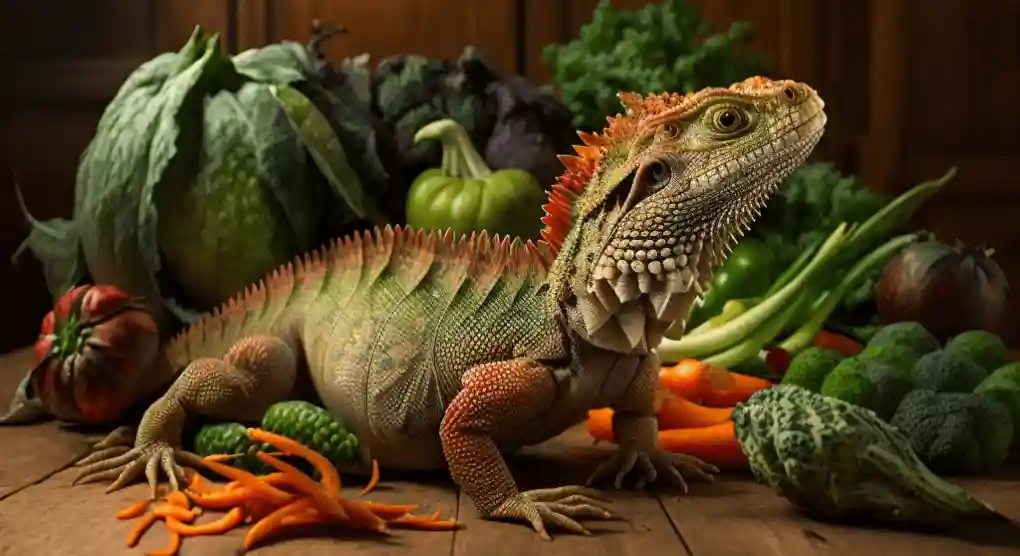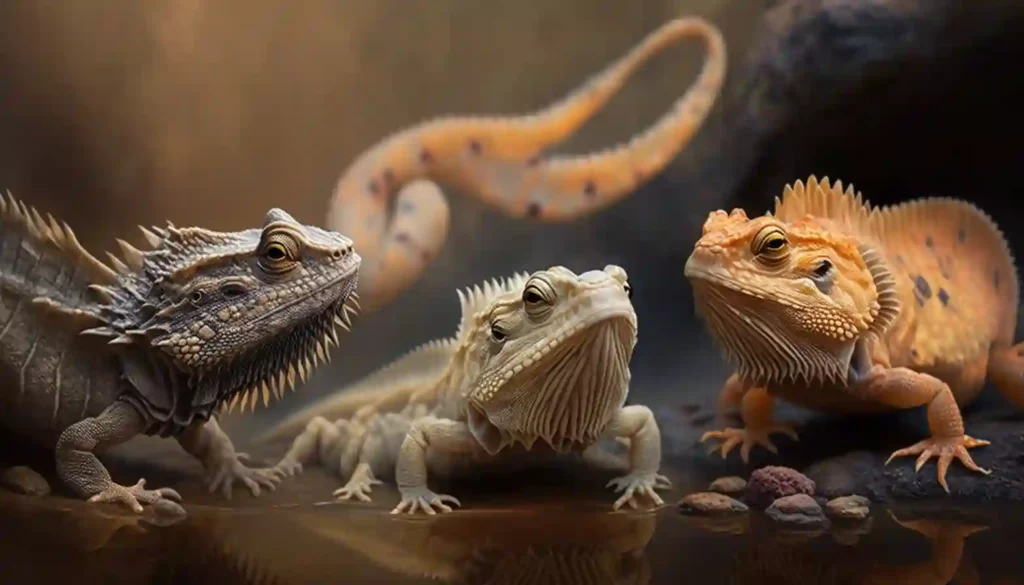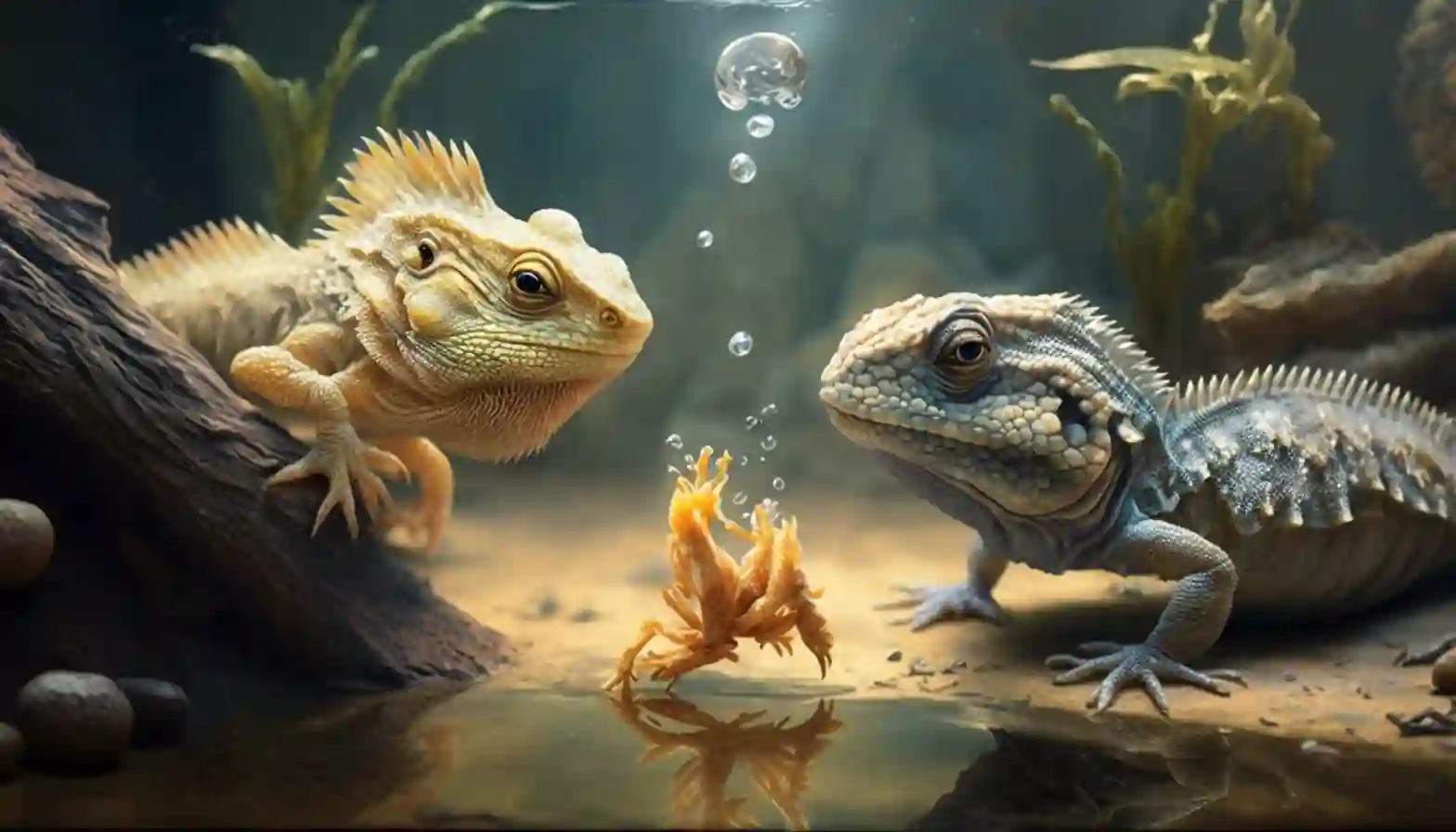It is not recommended to feed bearded dragons tadpoles or frogs, as they can carry parasites that may harm the dragon if ingested. In fact, feeding them frogs can cause intestinal issues for your bearded dragon. It is best to avoid feeding them any type of amphibian.
Similarly, bearded dragons should not consume any sort of frog or toad as they could be carrying microorganisms or different parasites that pose health risks for the pet.
Although frogs are a good source of vitamin A, there are many internal parasites present in them which can harm the bearded dragon’s health.
Wild toads and frogs can carry specific parasites that may cause a great number of troubles if consumed by the dragon.
Bearded dragons should have a diet consisting of insects such as locusts, brown crickets, cockroaches, mealworms, and waxworms.
It is important to avoid feeding your beardie wild insects due to the potential contaminants they can contain.
Why Shouldn’t Bearded Dragons Eat Tadpoles?

Bearded dragons are reptiles that require a balanced diet to stay healthy.
Though they might find tadpoles appealing, it would be ill-advised to feed them as part of their regular meals.
Tadpoles can contain parasites and bacteria which could make bearded dragons sick or even lead to death.
Feeding wild-caught tadpoles also increases the risk of introducing diseases into the home environment.
This is why feeding your bearded dragon with store-bought crickets, mealworms, wax worms, fruits, and vegetables should always take precedence over any other food source.
Not only will this help maintain a healthy diet for your pet but you’ll avoid exposing them to potential risks associated with wild-caught prey like tadpoles.
Therefore it’s best not to include these creatures in your reptile’s diet; instead, opt for readily available alternatives that provide essential vitamins and minerals needed for the proper growth and development of a beardie.
What Are The Risks Of Feeding Bearded Dragons Frogs?
When it comes to a bearded dragon’s diet, the old adage ‘everything in moderation’ rings true.
Feeding a bearded dragon live food is not without risk and frogs should be avoided for this purpose.
Frogs can carry parasites that could harm the health of your beloved pet. Tadpoles are especially high-risk since they spend much of their life cycle living in water – an environment that can host dangerous microorganisms capable of infecting dragons.
For these reasons, it is highly recommended to stay away from feeding tadpoles or any other form of the frog as part of your dragon’s regular diet.
In addition to the risks associated with parasites, there is also the potential danger posed by toxins found within some frogs and amphibians.
Some species may contain toxins that are harmful if ingested by reptiles such as bearded dragons; so unless you are certain that the type of frog being fed is safe for consumption then it is best to avoid them altogether.
It’s important to remember that every animal has different dietary needs and what works for one does not necessarily mean it will work for another – so take care when selecting foods for your beardie’s daily meals.
What Are Some Alternative Food Options For Bearded Dragons?

No, bearded dragons cannot eat tadpoles.
They can however benefit from an array of other food sources which include:
- Live insects such as crickets, mealworms, king worms, and locusts
- Dubia roaches – these are a great staple for bearded dragons due to their soft exoskeletons that are easy to digest
- Greens and veggies – leafy greens and vegetables should make up about 60-70% of your dragon’s diet
- Leafy greens: turnip tops, mustard greens, kale, Swiss chard, etc.
- Vegetables: sweet potatoes, squash, carrots (cooked or grated), etc.
- Fruits: apples (no seeds), berries (blueberries, raspberries, etc.) in small amounts
To the above-mentioned foods you can also feed your dragon waxworms or super worms but do so sparingly since they contain higher fat content than other live insects.
Bearded dragons should have access to fresh water at all times; this is especially true during summer when temperatures soar.
A shallow dish with dechlorinated water must be provided inside the enclosure daily and changed regularly.
Can Bearded Dragons Eat Any Type Of Frog Or Toad?
Bearded dragons can enjoy a wide variety of foods, with frogs and toads being no exception.
Frogs or toads are not the most commonly eaten food by bearded dragons, but they can be fed occasionally as treats.
The following table outlines what type of frog or toad is safe for your pet dragon:
| Type of Frog/Toad | Safe? |
|---|---|
| Fire-bellied Toads | Yes |
| Leopard Frogs | Yes |
| Bullfrogs | No |
| Green Tree Frogs | No |
It’s important not to feed your bearded dragon any wild-caught frogs or toads as these could contain dangerous parasites or diseases that may harm your pet.
It would also be wise to avoid feeding them bullfrogs and green tree frogs because they have toxins in their skin which could make your beardie sick.
Instead, choose fire-bellied toads and leopard frogs from reputable reptile stores.
These should always be gut loaded with crickets, waxworms, locusts, etc before being offered as food.
What Other Live Foods Are Recommended For Bearded Dragons?

No, bearded dragons cannot eat tadpoles.
The previous section topic covered whether or not they can eat any type of frog or toad and the answer is still no.
Moving on, let’s talk about what other live foods are recommended for them – there are quite a few.
Live crickets are probably one of the most popular food items that you could feed your beardie.
They provide essential nutrients like protein which helps with growth and development. Mealworms, waxworms, roaches, and locusts are also great options as they offer additional vitamins and minerals too.
All of these insects should be appropriately sized for your Beardie so that it doesn’t struggle while eating them.
Additionally, make sure to dust the insects with calcium powder before feeding them to ensure adequate calcium intake for your pet dragon.
It’s important to remember that variety is key when it comes to providing nutritional meals for your bearded dragon; monotony can lead to deficiencies in vital vitamins and minerals necessary for its overall health.
Therefore, incorporating different types of live insects into their diet will help keep things interesting while ensuring optimal nutrition at each mealtime.
